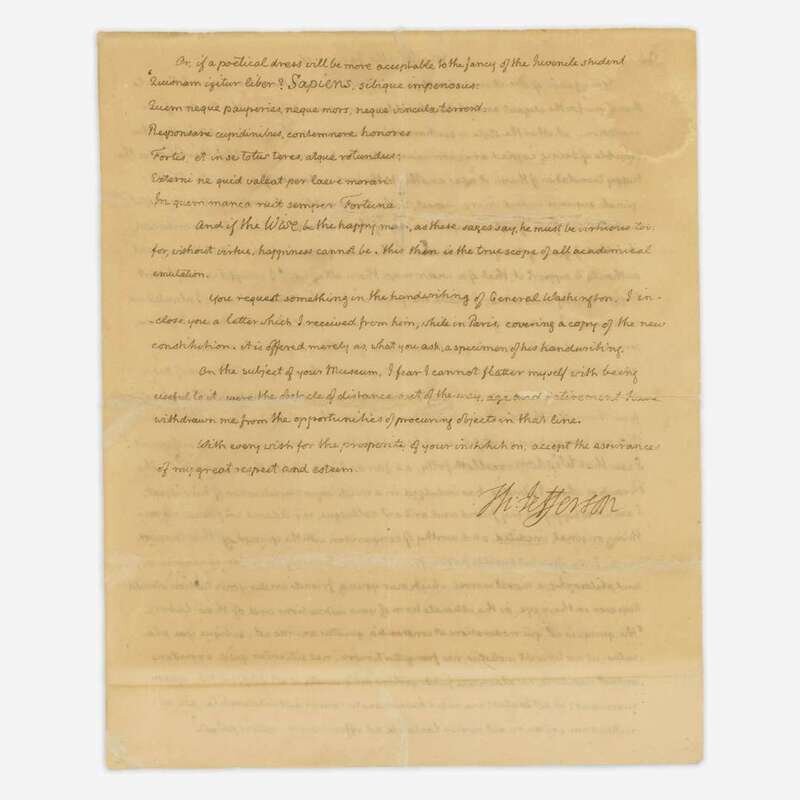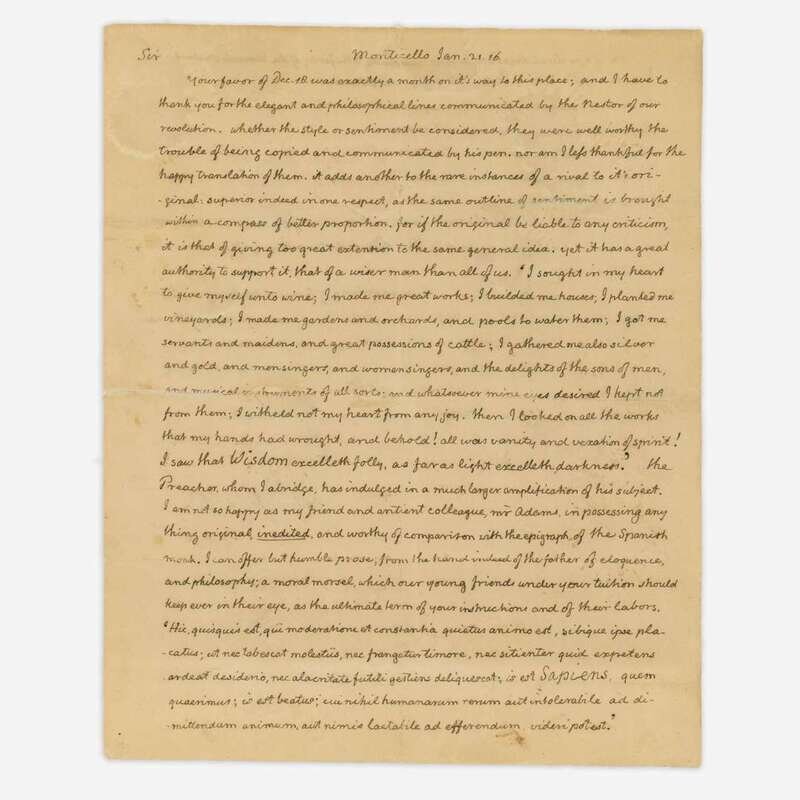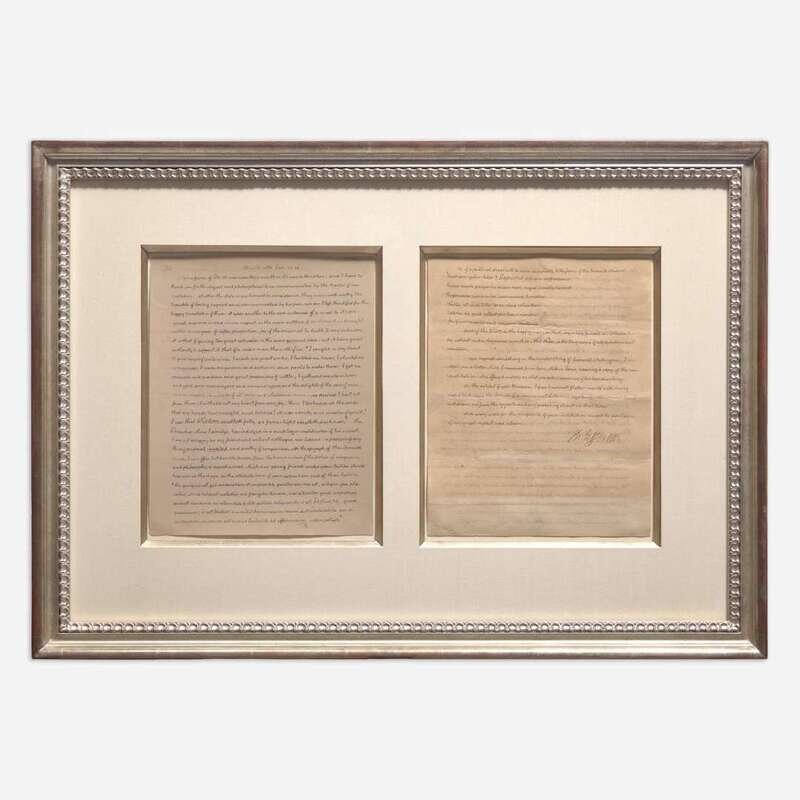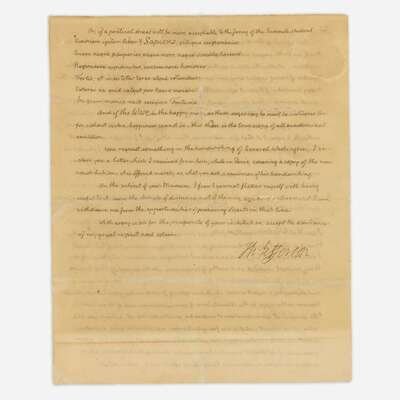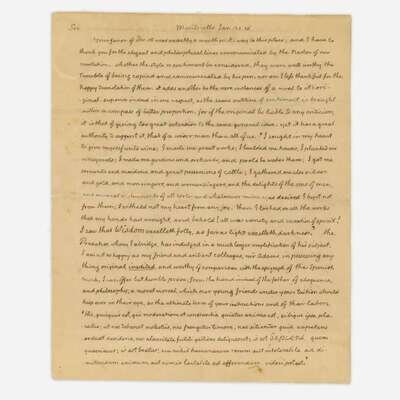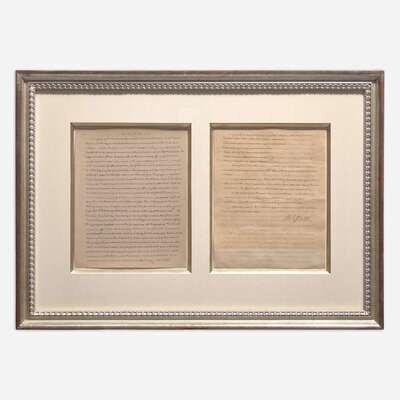Condition Report
Contact Information
Lot 15
Lot Description
Thomas Jefferson Reflects on Freedom, Wisdom, and Happiness, and Sends as a Gift George Washington’s Letter Transmitting the Constitution to Jefferson (who was then in France)
“And if the Wise, be the happy man, as these sages say, he must be virtuous too; for, without virtue, happiness cannot be. This then is the true scope of all academical emulation.”
Monticello, January 21, 1816. One sheet folded to make four pages, 9 5/8 x 7 3/4 in. (244 x 197 mm). Lengthy autograph letter, signed by Thomas Jefferson to Amos J(ones). Cook, preceptor of Fryeburg Academy, in the district of Maine. Creasing from old folds; expertly conserved. In frame, 17 5/8 x 25 1/8 in. (448 x 638 mm).
A remarkable and oft-quoted letter in which the 72-year-old “Sage of Monticello” furnishes his philosophy on freedom, wisdom, happiness and virtue, responds to Cook’s quoting “the elegant and philosophical lines communicated by the Nestor of our revolution” (John Adams), and fulfills his request for “something in the handwriting of General Washington,” by sending Washington’s September 18, 1787, where Washington announced to Jefferson the adoption of the United States Constitution.
Jefferson offers to Cook quotations from Ecclesiastes, Cicero and Horace. The latter two evidently had deep resonance for the former president as he had first copied them into his Literary Commonplace Book some 50 years earlier. Since then, Jefferson had weathered a lifetime of personal, professional and financial ups and downs, and from the perspective of old age he reflects on his life through a paraphrase of Ecclesiastes, 2.3–13: “'I sought in my heart to give myself unto wine; I made me great works; I builded me houses; I planted me vineyards; I made me gardens and orchards, and pools to water them; I got me servants and maidens, and great possessions of cattle; I gathered me also silver and gold, and men singers, and women singers, and the delights of the sons of men, and musical instruments of all sorts; and whatsoever mine eyes desired I kept not from them; I withheld not my heart from any joy. then I looked on all the works that my hands had wrought, and behold! all was vanity and vexation of spirit! I saw that Wisdom excelleth folly, as far as light excelleth darkness.’” The future founder of the University of Virginia concludes by offering a profound summation: “And if the Wise, be the happy man, as these sages say, he must be virtuous too; for, without virtue, happiness cannot be. This then is the true scope of all academical emulation.”
Lastly, Jefferson responds to Cook’s request for "something in the handwriting of General Washington," by enclosing “a letter which I received from him, while in Paris, covering a copy of the new Constitution”
In Amos J. Cook’s (1778-1836) December 18, 1815 letter to Thomas Jefferson, which prompted Jefferson's reply here, the schoolmaster explained that he was seeking specimens “of the hand-writing of a number of our most eminent characters” for his museum at Fryeburg Academy in Fryeburg, Maine (founded 1792). He had earlier received a reply and sample of writing from Jefferson's former political rival, John Adams, in 1807, to whom Cook had made a similar request. Cook closes by requesting from Jefferson “Whatever you may have to bestow on us, in behalf of science and literature will be gratefully received and acknowledged.—A piece of your hand-writing (and in Latin for our translation, if you think proper) I hope you will be pleased to grant”. He then adds a postscript: “Perhaps you may be able to furnish us a piece of the late George Washington’s hand-writing.” (see lot 14)
Cook displayed the letters in Fryeburg Academy’s museum, until the building was destroyed by fire in 1850. Both Washington and Jefferson's letters were assumed lost in the conflagration, until they were rediscovered in 1902 among the papers of Major James Osgood, an Academy trustee. In 2006, both letters were sold to benefit the Academy, and have not been offered for sale since. The survival of this letter from Thomas Jefferson to Cook establishes the unbroken chain of provenance of lot 14.
This letter is reprinted in The Papers of Thomas Jefferson, Retirement Series (Vol. 9, September 1815 to April 1816, edited by J. Jefferson Looney, Princeton University Press, 2012, pp. 374–375).
